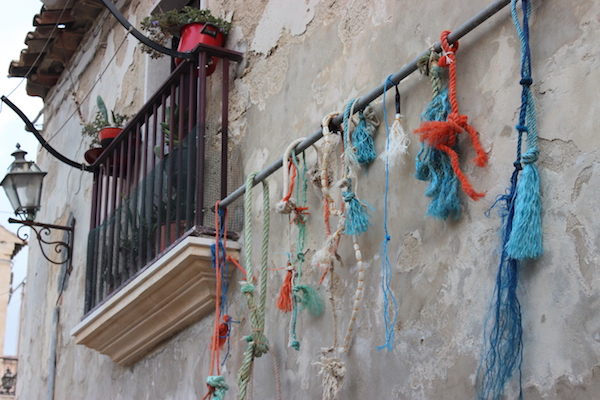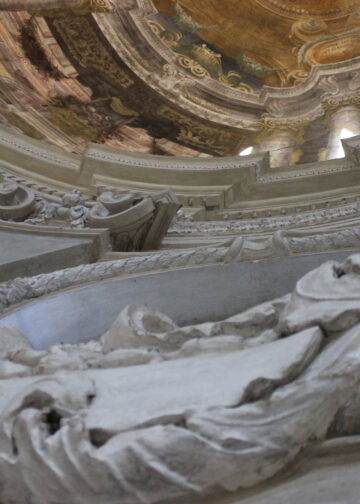Sometimes when Jane and I are waking up together, as I lie there snuggling up to her warm body, still halfway in a dream state, my mind will go places I otherwise don’t usually have access to.
One of these mornings about three years ago, it was before my surgery, before I even knew there was something wrong with my liver, as we were coming around together, I said: “Not that I’m in any hurry to get out of here, but today would be a good day to die.” Because my life is good. I feel loved, I feel good about myself, I have accomplished, more or less, all the things I could reasonably expect to accomplish in one reasonable life. I live in a place that to me is so beautiful that I don’t ever even feel the need to go anywhere.

Of course, I have done a lot of traveling, mostly before I turned 25. I have seen a lot of the world. And I have traveled a little since then too, but I mostly like to stay put. If I feel a need to go anywhere, I figure it must mean that the place I’m in I don’t like well enough. Or maybe I’m just lucky to not be restless anymore, or particularly curious about other places.
Well, I didn’t die that day, but soon after it turned out I had liver cancer. Surgery for this is a big deal. They took out two-thirds of my liver, and the recovery dragged on for about five months, which is even longer than usual.
So here it is the spring of 2017, and now I have a lot of nodules in my lungs that weren’t there at the CAT scan six months ago. Metastasized liver cancer. We don’t know how long I have to live, but they’re estimating between one and two years. Sometimes people get to live a long time after a prognosis like this, but we basically know that there is no cure for what I have. And I’m ok with this, I take it a day at a time. Jane is worried, but that makes sense since it’s always harder for those who will be left behind. They have to re-make their lives.
Me, on the other hand, I’ll just be gone. I’d still like to stick around for a good while. Enjoy Jane’s company which seems like it is getting sweeter by the day, even if we also argue, but that’s normal. If we didn’t, I’d think we were holding something in. Enjoy this beautiful place, now that it’s finally mostly silent, all the neighbors are mostly quiet, though some make a bit too much work noise for comfort sometimes.
Now that the place is mostly finished the way I want it to be, it would, of course, be nice to stick around and enjoy it. But the real issues here are of a more spiritual nature.
A number of things have contributed to my being able to take it all mostly with calm. I think the first thing to set me on a path to being able to accept death as something normal was reading Pär Lagerkvist’s The Eternal Smile. I don’t know when I came upon it, it’s more than 30 years ago. I have read it aloud for a lot of people, I remember reading it for my daughter’s mom in Yosemite or someplace like that when I was newly sober.
The way Pär Lagerkvist describes god is the only one I have ever liked. He’s humble. If I had a god I would want one like that, a god I could take a good example from, not the arrogant, vengeful one I was raised with. But I seem to do ok without one. I also like this novella for the individual stories, and especially the one about a young man who’s riding through the woods, and he comes to a mill one evening, and he completes his life there.
There’s something about that, completing one’s life. One could take the point of view that our lives are never complete, I guess, and that’s a defensible position to take, but somehow I have arrived at a place where my life feels complete. In my case it doesn’t mean it’s so complete I can’t add to it. In fact, when I was laying there on the couch for five months, one thing that kept me going was a plan to build an aquaponics system. I had taken some preliminary steps, made a level pad for the greenhouse.
Though I didn’t know much about aquaponics, I began studying it on the Internet right there on the couch. I needed a project, something to add to my life, a plan. Something to look forward to, since at that point I was presumably recovering, though I was really weak. Something to do. I have always been a doer. In some ways, I would say that project saved my life, for the time being anyway, though of course I don’t mean that to the detriment of the loving care I got from Jane and Patrick, plus help from many other people.

I’m here as a steward of my little spot on this earth. I wonder how it would be if I no longer felt I could do something good for the world. There are many other things I can do besides building stuff, of course, I just really enjoy building stuff. The writing I have done these last few years, the artwork I have made, the guidance I have been able to give my daughter, the energy I have put into AA, and the Laytonville Grange, these all feel like worthwhile contributions to this world, too.
Since I quit drinking and have been going to AA my life has, overall, only gotten better. Especially my sense of myself has improved. I started out shy and scared, and now, for the most part I’m ok with me, comfortable in my own skin. If I had been unhappy with my life, and here I’m not glossing over those periods which were nothing to be happy about, it would be different. But my life has come to a place where it is good. Where I’m happy with, how shall I put it, the way the quality of my experiences has improved, and how the way I have been able to participate in the world has left me satisfied with my contribution.
Sure, we all had big dreams when we were 20, but as we get older we at some point have to say, honestly, how much can a man do? I’m accepting that I didn’t get to be the man, after all, who changed everything about the world and made everything in it good. That’s just much bigger than me, but we can’t see that at 20 when the difference between a normal human lifespan and eternity doesn’t seem all that great.
What makes me happy with my life – that’s a funny thing to try to explain. If I weren’t happy with my life, I imagine I would look at death much differently. I’d have regrets about all sorts of things I didn’t do and want more time to do them, while in reality I’d probably just spend that extra time further lamenting that I hadn’t done them.
Without question, I wasted much time and made many poor choices in my life. But I changed it, and I’m always making my life a little better. I only contribute good things to life at this point. Well, I’m not perfect, I’m not a saint. I still make mistakes, and I can even be an asshole on occasion. But I don’t need to be a saint, I just need to be of a mind to leave the world a better place than I found it. And then accept that there’s only so much a man can do.
Speaking of events which changed my outlook on life, here’s a funny one: A while back I got a job to translate a big genealogical project. It was about people related to the manor house of Kjærgaard, near Ribe, Denmark. Some of it concerned the history of buildings and communities and some of the people connected with the manor house or living in the area.
Translating the genealogical records particularly was an eye opener. There was nothing in there that we don’t already know, but it got to be so real, as I was working on it: People died. Yes, of course, they died, because people die. But half of people’s kids died when small, and even when grown to adulthood they weren’t home free. Many people died in their 20s, 30s, and lots of women died in childbirth. Rich or poor, it didn’t seem to matter, they’d die early in their 50s, often of relatively minor stuff. And then there were a few who equally unexplainably would get to live into their 80s.
People died, and it’s amazing to think of how many times each of us alive today may have evaded a death that might have been certain and, if I may use this word, in a sense almost trivial 200 years ago. Granted, such deaths are still the lot of three-fourths of the world’s population. But it’s easy to lose sight of how incredibly fortunate we are to be living in this time and place, even with all its injustices and the increasingly insane and immoral politics.
Still, it angers me whenever I see a beautiful, strong, young man in his 30s with a bad limp. I am aware how this, the richest country in the world did not give him the relatively minor surgery he should have gotten. There is so much penny wise, pound foolish politics in this country which results in so much unnecessary human suffering. At least 200 years ago they simply were not able to save people. Now it’s just a result of mean-spirited, egotistical politics, and I have never been able to close my eyes to injustice.
And yet that translation job brought home to me how many events in our lives are outside of our control. Floods and other disasters happen, and people fall ill and die, and they do so whether they pray to imaginary deities to save them, or not. It is simply the course of life and its random events, in my life as in theirs.
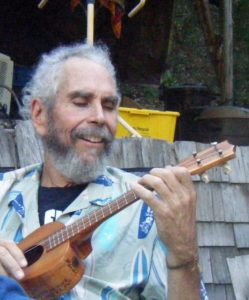
Another big thing that happened in my life with respect to how I live it and how I think about how to live it was my friend Jason getting cancer. Let me start by acknowledging that we have both spent a lot of time in AA, and one thing we both learned there, and both have been lucky enough to be able to apply to our lives, is the concept of taking life one day at a time.
If there is any way I can do things to take care of unfinished business from the past, and it will make my present life easier to live without conflict, then, by all means, I should do them. And as for tomorrow, if I can influence the course of my life with some well-laid plans and a non-hysterical determination to carry them out, then by all means I should do so, as long as I accept that while I can increase the odds in my favor, I don’t have any sort of ultimate control. I can only do my best, and even the best-laid plans can run afoul of circumstances. I can be on my way to some important part of that plan, and a bus falls out of the sky and kills me, or I can get cancer or something, as indeed I have. I have to accept stuff like this. I know it’s easier said than done. Some people just can’t. I’m a lucky guy in many ways.
Jason had cancer so bad that when they opened him up, intending to do some surgery, they just closed him back up again, gave him a colostomy bag, and sent him home to wrap up his life. And he did it well. Six weeks before he died he was riding his Harley one more time. He still surfed half a year before, and a couple of months before he died he played a concert at Harwood Park. Brown-eyed Girl will always be a song that I remember him by.
When someone started getting sad about it all, he would just tell them, “I’m already overpaid.” His life had been good too. He was able to let go of all regrets.
There were times he was in considerable pain. Jane gave him massages sometimes, which helped. Toward the end he would sometimes come over, and go lay down on our couch, and go to sleep, just to be close. But he never seemed to lose his positive spirit. Even when he died, and I was there about three hours before he did, he had lost all strength, couldn’t even talk anymore, but he gave me a half smile and a half wink. I knew we were both home free then. Death is ok.
Most people, when they die, have a bucket list, and it’s often about traveling and such. So then another friend of mine got cancer, Charlie. Like me, he loved building things. I’m content to run a water line or build a shelf out of plain plywood, but Charlie was a fine woodworker, turned bowls and things, and built fancy cabinets.
We worked together on some kitchen projects back when I was a contractor. When he was told he had cancer, he tried chemo once or twice but decided to not deal with all the discomfort. He was going to go out in style. And th is meant not wasting his time lying around being sick with chemo treatments. He had things he needed to build, yet. A couple of somewhat ordinary things, a door, and a table, but then also he wanted to build a guitar. He’d saved just the right piece of wood for that guitar for god only knows how many years, and he wasn’t about to not get it done.
is meant not wasting his time lying around being sick with chemo treatments. He had things he needed to build, yet. A couple of somewhat ordinary things, a door, and a table, but then also he wanted to build a guitar. He’d saved just the right piece of wood for that guitar for god only knows how many years, and he wasn’t about to not get it done.
That was his bucket list, build some things. There may have been more on it, I don’t know, but these building projects took up a lot of his last bit of time, so that was probably pretty much it. I like that, shows great humility to still want to make something for the world, rather than do a whole bunch of traveling.
I have a place or two I may want to go, but it is not that big a deal to me. I’m happy here. Not idiotically happy, just happy in a content sort of way. If I never go anywhere again, that’s really ok. Any day I spend here, and maybe even get to do something I like to do, is a good day.
So in this way, I have been learning from my friends. I guess it’s all about acceptance. This is a concept they push a lot in AA, and there it is mostly a very godly thing: “Nothing, absolutely nothing happens in god’s world by mistake,” it says in The Big Book – and therefore we should accept everything.
Well, right off I think this is a bunch of shit. I have to say I don’t understand why I should or would accept things any less if instead everything, absolutely everything in “god’s world” happens by random chaos. There’s almost even more reason to accept it then because there is no way at all for me to control it.
With a god in charge, I could at least try to influence god to do things my way by praying for something, in other words, not accept god’s initial decisions after all, at least until he had taken time out to consider that maybe I had a better idea than he did. But with no god there to meddle with it all, what else can I do but to accept it?
Things are so much simpler without a god. I don’t have to concern myself with whether I go to heaven or hell after I die since neither one makes sense to me. I don’t have to wonder about my score, and whether events in my life are god’s way of rewarding me for good behavior, or punishing me, or giving me a challenge to learn from or whatever. Christians concern themselves with all that stuff way too much.
I’m simply here while I’m here, and I don’t have to clutter my mind with all that. I guess I could be called an existentialist. Believers get their morals from gods. To me, common sense is enough. I don’t want to argue with anyone about the meaning of life. Life is whatever we make of it. I can see with my own eyes that things go better in this world if I speak my truth, and conduct myself in a socially kind and responsible manner.
The meaning in my life comes from what I put into it. Ultimately one could say there is no meaning to anything. But we don’t live in a vacuum. My life has meaning in the context I live in. I have a partner, a daughter, friends I care about. I have a beautiful place where I can sit by my pond and simply be one day, and with all sorts of projects to work on another day. I have my artwork and my writing. This all has meaning in the context I live in.
I don’t need to make it complicated and ponder ultimate, irreducible questions and problems. I have been raised in a society which, while mostly Christian, has given me a variety of moral values. Doesn’t mean I would call those values Christian values, I think that is putting things on their head.
Rather, over the centuries society has infused their religion with the moral values they were going to live by anyway because in the course of the development of a culture certain ways of people relating to each other make better sense than others.
So as a society, you can collectively arrive at a social contract that says don’t kill or steal from your neighbor, or you can put together a religion that tells you the same thing. It’s nice to have it sanctioned or commanded by a god. Gives it authority and weight. If you believe in that god. Otherwise, you can just arrive at the same social contract by seeing that it works, and so may as well go by it. Same difference to me. I just can’t see making life’s big questions too big. Keep it simple.
So I have lived by this in my dedicated if imperfect way. I imagine if my brain chemistry had been just a little bit different I could have been depressed, could have lived based on regrets, and other negative feelings. In the end I guess I have to accept it as not much other than simple chance and good luck that my life is good, and that my feelings are mostly in the positive register. True, I have worked for it, but my work could as well have been fruitless as it could have been successful.
Today I have a cancer which I most likely will not be able to recover from. I could be dead a year from now, maybe two. But what else can I do but accept it? I’m just grateful that a variety of events and people in my life together have all coalesced to leave me with a positive outlook.
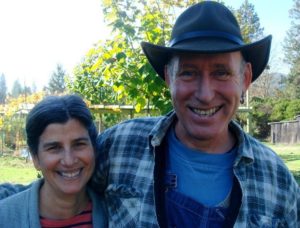
I want to again recognize the joy of being with Jane these last 10 years or whatever it’s been. Like everything else in my life, it has not been perfect. I haven’t, she hasn’t, it hasn’t. But it doesn’t need to be. Other than when we’ve just had an argument, anytime I look at her I jump with joy. I feel loved. Feel is probably the key word here. I may have been loved before, but not known it, not been able to fully experience it, feel it, trust it, believe it. Now I have, here I can.
We don’t know where it is all going. Maybe I’ll be gone in a year. Maybe something unexpected will let me recover, and live to be 90. Maybe Jane will die a few years before me. This would be awful for me. To be the one left behind. And I realize that Jane is facing such a scenario. But at least she has a daughter, a grandson, and siblings close by. She has finally begun establishing herself as part of the community here and making friends. And at least I can leave her a place where she has a good shot at living comfortably for a good while.
My daughter Melina has been another blessing in my life. Funny that things should happen such that I got to be a dad at 45. It has been a real gift to be able to do things with her which my own parents were always too busy to do, but which at least my uncle Hejse did with me quite a bit. I’m grateful for the things he taught me.
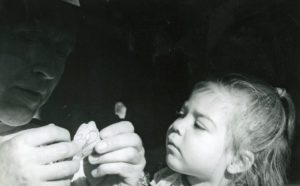
In turn, it was beautiful to take Melina for a walk when she was just maybe 2-1/2, up to Strawberry Creek, sit and play by the water which U.C. campus authorities warned could be unhealthy. We’d sit there, and occasionally a sun ray would find its way down through the redwoods or eucalyptus, and a water nymph would alight, and we’d look at it as if we never really had looked at it before, which in a very real sense I guess we hadn’t. It’s really a special experience to get to do all kinds of firsts with a child. We spent many days by that creek.
Now let me just wrap up with the following story. It’s all about continuity, and in a sense about closure. Doing things like this which feel like they have significance is part of what makes my life feel full, and having my life feel full is what it takes to be able to turn it over in good spirits when it is time to do so.
When I went back to Denmark in around 2012 to visit my mother, and my daughter came up from Italy, she and I went back to the creek of my childhood. Melina had just turned 16, and she is a well thought out sort of person, but still, I don’t know how much she understood of it. We did go there once when she was about three, but of course, she could not remember.
Myself, I was somewhat disoriented there and got lost a few times. Not seriously. After all, there’s no place these woods are more than a half mile across, or maybe a mile, but even though the underlying landscape is the same, things have changed a lot in the 50 years since I played here. Trees that were now large had been saplings then. A shooting range had long since been closed, no one ever came here anymore. The paths were gone, the rutted, muddy roads were gone — only thing left was the creek. It didn’t flow quite as well as when we were kids, and I no longer dared to drink from it like we did when I was 10, but somehow I needed to pass my creek on to Melina. Make it home to her like it had been to me. I know that could never really happen, but maybe I could just somehow give her the creek anyway, make it hers like it had been mine.

I thought of a ritual that would do it. I couldn’t start giving her a speech or something else weird, but what I ended up doing was to bow down and cup my hands, and ask her to cup hers. Then I scooped up a handful of water and poured it into hers. Now it’s her creek too. I think she understood, or else she was just too graceful to say she didn’t. Or maybe all she understood was that here was something really important to me.
We don’t see each other often, nowhere often enough, but I try to somehow make the time we spend together real, even if it gets to be intense sometimes. We both felt a little awkward, but not too much. Then we took pictures of the place all around and walked back out to civilization. Got lost a few times on our way out. Not seriously. After all, these woods which seemed endless to me when I was a child, and where I got lost many times until I got to know them from one end to the other, are only small. The town was small, not even a village. My grandparent’s place is gone, burned down, replaced by some contractor’s dream monstrosity. I’m gone, long gone. Continuity is a hard thing to create these days, I did my best, I hope it works, and Melina gets to walk with my creek in her heart.
[Editor’s note: Life Jensen passed away on December 14, 2019.]
This piece was first published on July 2, 2017 in AA Beyond Belief and is republished here courtesy of the author. The original article includes a reading of the story and can be accessed by clicking the link provided above.
Most original photography in the essay are by Leif jensen; picture of life-j and Jane by Melina Piccolo and picture of Melina and Jane by Beth Kagel.
Audio Story













































